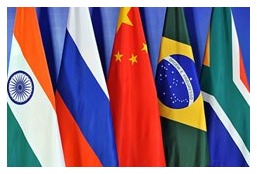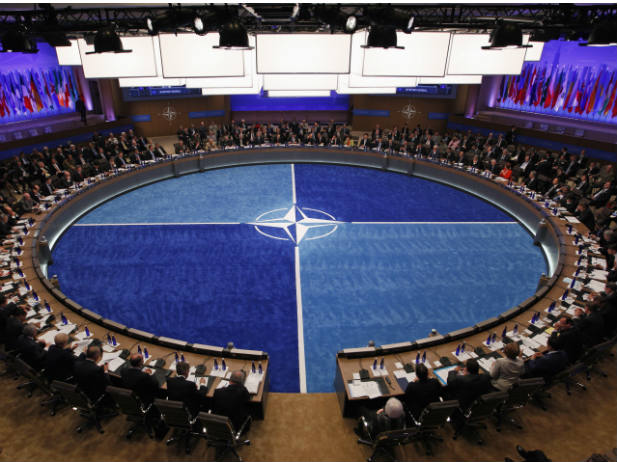As summit season is almost upon us, everyone is talking about the upcoming meeting of NATO and the G8. Amid all the controversy and sheer amount of information in the media about these two summits, let us not overlook another meeting that happened recently: the March 29 BRICS Summit in New Delhi.
[captionpix align=”left” theme=”elegant” width=”380″ imgsrc=”http://www.sarkaritel.com/wp-content/uploads/2012/03/29brics-summit1.jpg” captiontext=” Dilma Rousseff, Dmitry Medvedev, Manmohan Singh, Hu Jintao and Jacob Zuma at the Brics summit in New Delhi. Photograph: Li Tao/Xinhua Press//Corbis”]
BRICS is a group comprising Brazil, Russia, India, China, and South Africa. The leaders of these countries have been holding annual summits since 2009; with South Africa joining the group only last year. According to the latest estimates, the four original BRIC countries account for 25% of the world’s land mass, 40% of its population, and 25% of global GDP. According to Goldman Sachs, their combined economies are expected to surpass those of the G7 countries by 2035. In other words, it looks as though the forecast for BRICS promises a rosy economic future.
The Summit seemingly confirmed the BRICS’ good fortune, which contrasts with disunity within NATO and the tumult of the Eurozone. The group even wants to create a new development bank, which would pose a counterweight to the financial institutions currently dominating the global economy, namely the IMF and World Bank. The outgoing World Bank president Robert Zoellick responded to this news by stating: “As a general principle, if the BRICS countries want to develop it [their bank], we [the World Bank] would work with it.”
Apart from talking about the global financial situation, the BRICS reached consensus on many important political issues at New Delhi, including the situations in Syria and Iran. Russia and China have drawn particular attention in this regard, acting in unison at the UN at every vote concerning Syria – from the two infamous vetoes of resolutions condemning the Syrian army’s violence against civilians to recently endorsing Kofi Annan’s ceasefire plan.
In the midst of this seeming consensus on all fronts, some analysts are talking about a lack of cohesion in the BRICS group. To begin with, it is interesting to see the coming together of these five countries that have very different political systems, ranging from democracy to complete autocracy. According to Freedom House rankings, Brazil and South Africa are the freest of the group in terms of democratic governance, civil liberties, and the press freedom. China is the barely above the worst ranked countries in the world, while Russia and India fall somewhere in between (with Russia faring much worse than India overall). Can such a disparate bunch speak with one voice on important international issues? It is unlikely to hold up in the long term. We already saw a division in their ranks, when Russia and China vetoed the second UNSC resolution on Syria, while India, Brazil, and South Africa had all voted for it. This casts doubts on the seriousness of the Delhi Declaration which stated that they have reached common ground with respect to the Syrian issue.
Apart from such obvious inconsistencies, there are deeper issues that prevent BRICS from truly speaking with one voice, and hence being influential as a block. In defence of the BRICS, one might point to frequent disagreements among the members of other prominent blocks, such as the EU or NATO. While that is true, none of them have unresolved issues amongst themselves, as China and India do with their border dispute.
In a recent article, Robert Kagan has stated that “if America’s future competitor in the world is likely to be China, then a richer and more powerful India will be an asset to the United States.” If there are tensions between BRIC members, not only can they be exploited by other nations, as Kagan is suggesting, but they will also prevent them from exhibiting any real influence on world affairs together.
Yes, the BRICS are growing economically and is destined to crowd out Europe and Japan out of the spotlight of economic dominance soon, but its political clout leaves a lot to be desired. This is a case of not seeing the forest for the trees. Five big trees cannot grow side by side for too long because there isn’t enough space for them all. They start competing with each other, which eventually leads to serious struggles. That is the case of the BRICS.
Where Does Russia Fit In The Quintet?
Does it fit at all? Some argue that it does not, and should be dropped entirely in favour of a more compatible member. If we turn to statistics once again, Russia seems ahead of its partners with more resources and raw materials, a larger and better educated middle class, and a higher GDP per capita.
At the same time it ranks very high on corruption, institutional weakness, poor business climate, non-diversified economy, a declining population and a brain drain. Gloomy predictions are abound about how Russian over-dependence on oil and gas export will lead to unbalanced budgets and unfulfilled promises, which will affect the government’s standing internally and the country’s standing internationally. This growing weakness is particularly noticeable in the company of such rapidly developing giants asChina,Brazil andIndia.
The reason Russiajoined BRIC in the first place was to project influence globally as a counterweight to the West in the face of the USand the big Western European states, which dominated world politics and economy. While BRICS are offering an alternative pole of world dominance, Russia’s influence within that pole is gradually waning. China is not only making the US uncomfortable, but Russia too, despite constant reassurances of warm friendly relations. Should it then drop the BRICs, as some observers argue?
If Moscow distances itself from the BRICS (who will turn into BICS, presumably), should it look for rapprochement with the West? Here too there are matters of contention however. Russia remains distrustful of the US and the EU, especially on the issue of NATO’s missile defence shield. It is an intractable problem, where the West can show only so much flexibility, and Russia shows none at all. Yet they continue cooperation on other fronts, specifically in some joint exercise ventures.
Finally, if Russia distances itself from both BRICS and from the West, it will have to build some sort of base around it from which to project power. Developments in that direction seem to be shaping up in the form of the Eurasian Union, which currently includes Russia, Belarus, and Kazakhstan, with Tajikistan and Kyrgyzstan announcing their intention to join in the future as well.
The record is mixed. Russia does not have a steady and reliable relationship with any of the major global actors. Evidence indicates that Russia is lost. It is at a crossroads. Many have picked up on this trend after the recent post-election in Russia, but there is more at stake. The country is experiencing two parallel turmoils: an internal and an external one. While all the focus is on the internal one, which is hailed as the awakening of the Russian people from centuries of submission to autocrats, an almost tragic picture is unfolding externally.Russia has not been a true decider of global affairs for over two decades. The problem is that it still wants to return to that status. This mentality, which is not foreign to ordinary Russian citizens and not simply Putin’s obsession, is a disease that needs to be cured. So long as Russia (and Russians) feel entitled to their former geopolitical status, they will continue being difficult and stubborn negotiators with the West. This sense of entitlement – at the level of the people – comes from feeling sidelined for too long and wanting to have a say. But they have also been sidestepped by their own governments. Unfortunately, too many Russians still believe that the West is complicit in their being ignored, which is evident when one reads the blogosphere and online commentary.
Russiais a complicated case of hurt pride and expectations that never came true. The Putin regime is losing its grip on all levels of the political game, and seems destined to lose. But perhaps there is a solution. This solution is to stop building all the relationships on the premise that it must get the better of the other side and on the belief that the West is out to deceive it. Russia does not yet fully understand the language of Western democracies, but if it learns it, it can save itself from its own worst fear: total irrelevance. Alignment with BRICS, despite being a useful economic group, is not the answer in the long-term.


